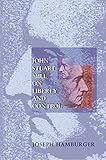John Stuart Mill on Liberty and Control / Joseph Hamburger.
Material type: TextPublisher: Princeton, NJ : Princeton University Press, [2001]Copyright date: ©1999Edition: Core TextbookDescription: 1 online resource (264 p.)Content type:
TextPublisher: Princeton, NJ : Princeton University Press, [2001]Copyright date: ©1999Edition: Core TextbookDescription: 1 online resource (264 p.)Content type: - 9780691089881
- 9781400823246
- 320.01
- JC223.M66 H363 1999
- online - DeGruyter
- Issued also in print.
| Item type | Current library | Call number | URL | Status | Notes | Barcode | |
|---|---|---|---|---|---|---|---|
 eBook
eBook
|
Biblioteca "Angelicum" Pont. Univ. S.Tommaso d'Aquino Nuvola online | online - DeGruyter (Browse shelf(Opens below)) | Online access | Not for loan (Accesso limitato) | Accesso per gli utenti autorizzati / Access for authorized users | (dgr)9781400823246 |
Browsing Biblioteca "Angelicum" Pont. Univ. S.Tommaso d'Aquino shelves, Shelving location: Nuvola online Close shelf browser (Hides shelf browser)

|

|

|

|

|

|

|
||
| online - DeGruyter Culture on the Margins : The Black Spiritual and the Rise of American Cultural Interpretation / | online - DeGruyter Patterns for America : Modernism and the Concept of Culture / | online - DeGruyter Enemy in the Mirror : Islamic Fundamentalism and the Limits of Modern Rationalism: A Work of Comparative Political Theory / | online - DeGruyter John Stuart Mill on Liberty and Control / | online - DeGruyter The Moral Purpose of the State : Culture, Social Identity, and Institutional Rationality in International Relations / | online - DeGruyter Sovereignty : Organized Hypocrisy / | online - DeGruyter Stuck in Neutral : Business and the Politics of Human Capital Investment Policy / |
Frontmatter -- CONTENTS -- EDITOR'S NOTE -- PREFACE -- ACKNOWLEDGMENTS -- Chapter One. LIBERTY AND CONTROL -- Chapter Two. CULTURAL REFORM -- Chapter Three. MILL AND CHRISTIANITY -- Chapter Four. CANDOR OR CONCEALMENT -- Chapter Five. ARGUMENTS ABOUT CHRISTIANITY IN ON LIBERTY -- Chapter Six. THE RELIGION OF HUMANITY -- Chapter Seven. INDIVIDUALITY AND MORAL REFORM -- Chapter Eight. HOW MUCH LIBERTY? -- Chapter Nine. MILL'S RHETORIC -- Epilogue -- INDEX
restricted access online access with authorization star
http://purl.org/coar/access_right/c_16ec
John Stuart Mill is one of the hallowed figures of the liberal tradition, revered for his defense of liberal principles and expansive personal liberty. By examining Mill's arguments in On Liberty in light of his other writings, however, Joseph Hamburger reveals a Mill very different from the "saint of rationalism" so central to liberal thought. He shows that Mill, far from being an advocate of a maximum degree of liberty, was an advocate of liberty and control--indeed a degree of control ultimately incompatible with liberal ideals. Hamburger offers this powerful challenge to conventional scholarship by presenting Mill's views on liberty in the context of his ideas about, in particular, religion and historical development. The book draws on the whole range of Mill's philosophical writings and on his correspondence with, among others, Harriet Taylor Mill, Auguste Comte, and Alexander Bain to show that Mill's underlying goal was to replace the traditional religious basis of society with a form of secular religion that would rest on moral authority, individual restraint, and social control. Hamburger argues that Mill was not self-contradictory in thus championing both control and liberty. Rather, liberty and control worked together in Mill's thought as part of a balanced, coherent program of social and moral reform that was neither liberal nor authoritarian. Based on a lifetime's study of nineteenth-century political thought, this clearly written and forcefully argued book is a major reinterpretation of Mill's ideas and intellectual legacy.
Issued also in print.
Mode of access: Internet via World Wide Web.
In English.
Description based on online resource; title from PDF title page (publisher's Web site, viewed 30. Aug 2021)


